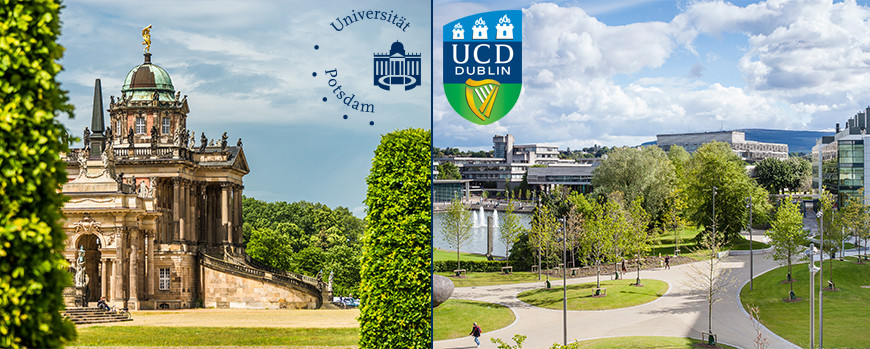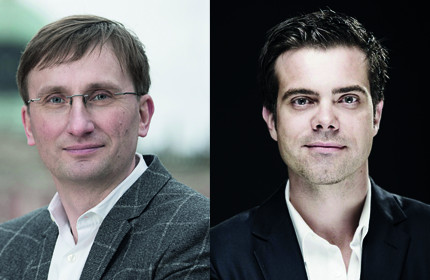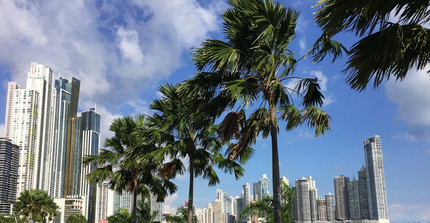International War Studies | Master

The English-language MA in International War Studies is a double degree program with the University College Dublin. Students spend their first year at the University of Potsdam and the second year at University College Dublin. Upon completion of their MA thesis in Dublin, students will be awarded two master’s degrees. This double degree program caters primarily to international applicants. Those applicants who are German native speakers (C1 level) can apply for our MA in War and Conflict Studies.
| Name | International War Studies |
| Degree | Master of Arts (Double Degree) |
| Standard period of study | 4 semesters |
| Credit points | 120 |
| Language of instruction | English. Some courses may be taken in German. |
| Start of study (1st semester) | Winter semester |
| Campus | Am Neuen Palais & University College Dublin |
| Fees & Charges | Semester fees and charges: yes Tuition fees: yes |
- PROGRAM FLYER (UP) (PDF 373KB)
Program Content
The International War Studies degree program examines the causes, dynamics and contexts of violent conflicts at a national and international level, as well as their pre-history, course of events, and consequences. The program focuses primarily on military history, the cultural history of political violence, and military sociology, with each field’s respective methodologies and theories. The interrelationships between the state, society and the military are analyzed from the beginning of the Early Modern period to the present day. The program concentrates on modern history (the 19th and 20th centuries).
Course Objective and Future Career Options
Students will acquire abilities and competences that enable them to analyze historical and current conflicts. They will deepen and expand their subject-specific competences to include essential content from military sociology, the history of violence, and military history. Students will refine their use of methodologies in the social sciences and humanities, become capable of discussing various subjects in a critical manner, and learn how to present the findings of their work in an appropriate way.
The program’s international orientation, as well as its location in Dublin and Potsdam, offer students global career opportunities. There are also no limits when it comes to future fields of work. Opportunities abound in International Organizations and NGOs, in academia, the media, fields related to politics and policy, think tanks, museums, foundations and cultural management and communications. Click here to find an overview of further careers available to you after graduation.

the program's initiators
„We offer our students the best conditions for university studies, attractive internship positions, and an international atmosphere that lays the foundation for later success in professional life.“
Prerequisites for Admission to the Master’s Program
The foundation of your application and your acceptance into the master’s program is a strong interest in political, social and historical events.
Applying for a master’s degree requires that you hold an undergraduate degree, such as a bachelor’s degree. Your undergraduate degree must be in a field relevant to International War Studies, such as history, political science, sociology or a related subject. Proof of 40 credit points in one of these subject areas is sufficient. If your transcript comes from a system that does not use credit points, then the joint Examining Board will make a decision about the equivalence of academic performance. Because the master’s degree program is also conducted in English, we require proof of English language skills that correspond at least to Level C 1 of the Common European Framework for Languages. German language skills are not required.
You can read more about the subject-specific admission requirements in the respective Admission Regulations.
Program Structure
This four-semester master’s degree program requires the completion of 120 credit points. The following overview provides information about the weighting of individual modules and types of courses. For additional information, please consult the subject-specific Degree Regulations or the Departmental Advisory Office.
Student testimonials on the program
Modules | Credit points |
|---|---|
| Mandatory modules | 60 CPs |
| Introduction to International War Studies | 9 CPs |
| The Military and Society in the Age of “Total Wars”, 1792-1945 | 15 CPs |
| Themes and Methods of War and Conflict Studies | 6 CPs |
| Study Abroad Module Dublin 1: Modern History and Politics | 10 CPs |
| Study Abroad Module Dublin 2: Political Violence in 20th Century Europe | 10 CPs |
| Study Abroad Module Dublin 3: War Studies | 10 CPs |
| Elective Fields Two modules of 15 credit points each must be successfully completed. | 30 CPs |
| Military and Society after 1945 | 15 CPs |
| International History since the Early 20th Century | 15 CPs |
| Related Study Areas of Military History | 15 CPs |
| Conflict, Security and Armed Forces – Historical and Social Science Approaches | 15 CPs |
| Security Studies | 15 CPs |
| Master’s Thesis | 27 CPs |
| Final Colloquium | 3 CPs |
| Total | 120 CP |
Advantages at a Glance
The program’s international orientation enables a broad array of opportunities for creating your own academic profile. As places of research, Dublin and Potsdam house a diverse set of cultural and political institutions that constitute a unique environment for research and teaching.
The program offers an international environment for higher education and global career opportunities. By collaborating with several partners in Germany, Ireland and the United Kingdom, long-running cooperations exist to help place students as interns in ministries, the media, museums and think tanks.
The University of Potsdam has taken into account the actual conditions among students and introduced the option for part-time study into several degree programs. This also pertains to International War Studies. However, if you aim to obtain two degrees (Double Degree), part-time study is only possible during your first year of study. For more information, go to part-time studies at the University of Potsdam.
Application
Have you decided to study for a master’s degree in International War Studies at the University of Potsdam? Then you should take the next step and get more information about the current application and enrollment procedures at the application website.
Frequently Asked Questions
Short answers to the most important and frequently asked questions about applying for and enrolling in the International War Studies (IWS) program at the University of Potsdam and the University College Dublin.
Frequently Asked Questions
Contact
University of Potsdam | Department of History
Christian E. Rieck | Departmental Advisory Office
Campus Am Neuen Palais
Building 11, Room 1.Z04
Contact
University College Dublin | UCD School of History
D'Arcey Jackson | School Manager
UCD School of History, University College Dublin, Belfield, Dublin 4
This description is based in part on information from the subject-specific regulations for a master’s degree in International War Studies at the University of Potsdam and the University College Dublin dated February 9, 2022 (AmBek No. 16/22, p. 626).







